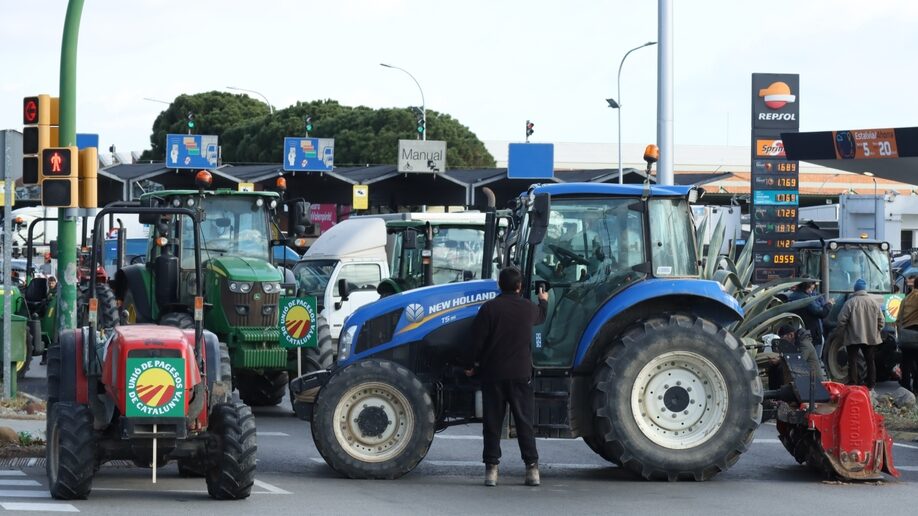
Access to Mercabarna, the most important wholesale market in Barcelona, blocked by the tractors of the farmers’ protest.
Photo: Jordi83 / Shutterstock.com
On Wednesday morning in Spain, farmers had several roads and highways around a dozen cities from the north to the south of the country blocked. Caravans of tractors cut off highways in both directions, blocked entrances, and caused traffic jams in Burgos, Cuenca, Guadalajara, Jaén, Málaga, Palencia, Santiago de Compostela, Seville, Toledo, Valladolid, the port of Motril in Granada, and Mercamadrid, the largest logistics center in Spain.
It is the ninth consecutive day of demonstrations by farmers, whose sector has been stretched to the limit by low prices, rising costs, drought, imports from outside the EU, environmental regulations, and bureaucracy. They are demanding immediate action from the government to begin addressing the issues.
These demonstrations were organized by the country’s three principal farmers unions, COAG, Asaja, and UPA, and unlike the spontaneous protests organized over social media and Telegram platforms in the previous days, had the government’s blessing in the form of authorisation.
The unauthorized protests in various parts of the country had led to confrontations between police and farmers when police tried to clear the roads. The platform 6F, behind much of the movement of farmers, denounced police violence against the protestors. Some participants also had their social media accounts closed when they posted videos of the police actions, according to the organization.
“The Government assured that the protests are legitimate while the instructions were to beat them [protesters] up,” the spokesperson and legal advisor of the platform, Xaime da Pena said, adding that the platform planned to take legal action against Minister of the Interior Fernando Grande-Marlaska and the police who participated in the clashes.
The platform is also considering new strategies after the violent clashes with government security forces—including releasing farm animals onto motorways.
“Today there are loose animals throughout Spain, and soon they will be on the roads. Let’s see if the government dares to harm animals,” da Pena commented.
Meanwhile on Wednesday, farmers barricades of roads in the Catalonia region near the border with France continued. About 400 farmers continue blocking the AP-7 in Gerona about forty kilometers from the French border, as well as access to the Port of Tarragona. The farmers told the media they intended to maintain the blockage throughout the day to complete 48 hours of blockade.
Wednesday’s protest coincided with the meeting of the Food Chain Observatory. One of farmers’ demands is that Spain’s food chain law be properly enforced. Under the law, it is illegal to buy products from farmers below the costs of production. Farmers allege, though, that the rules are not being followed or enforced. The sometimes huge disparities between the prices paid to farmers for their products and the final selling price to consumers, has been reported by Spanish media.
On Thursday, Spain’s agricultural minister Luis Planas will also sit down with Asaja, COAG, and UPA for talks. Farmers also want greater flexibility in the national plan to implement the Communal Agricultural Policy from the EU, the source of subsidies for farmers, and more support in the face of chronic drought.
The principal farmers organizations have also obtained authorization for a slow march of tractors along the highways that access the Spanish to the capital on February 20th. Another manifestation in Madrid is scheduled for February 26, when the EU’s Council of Agriculture Ministers is set to meet.
